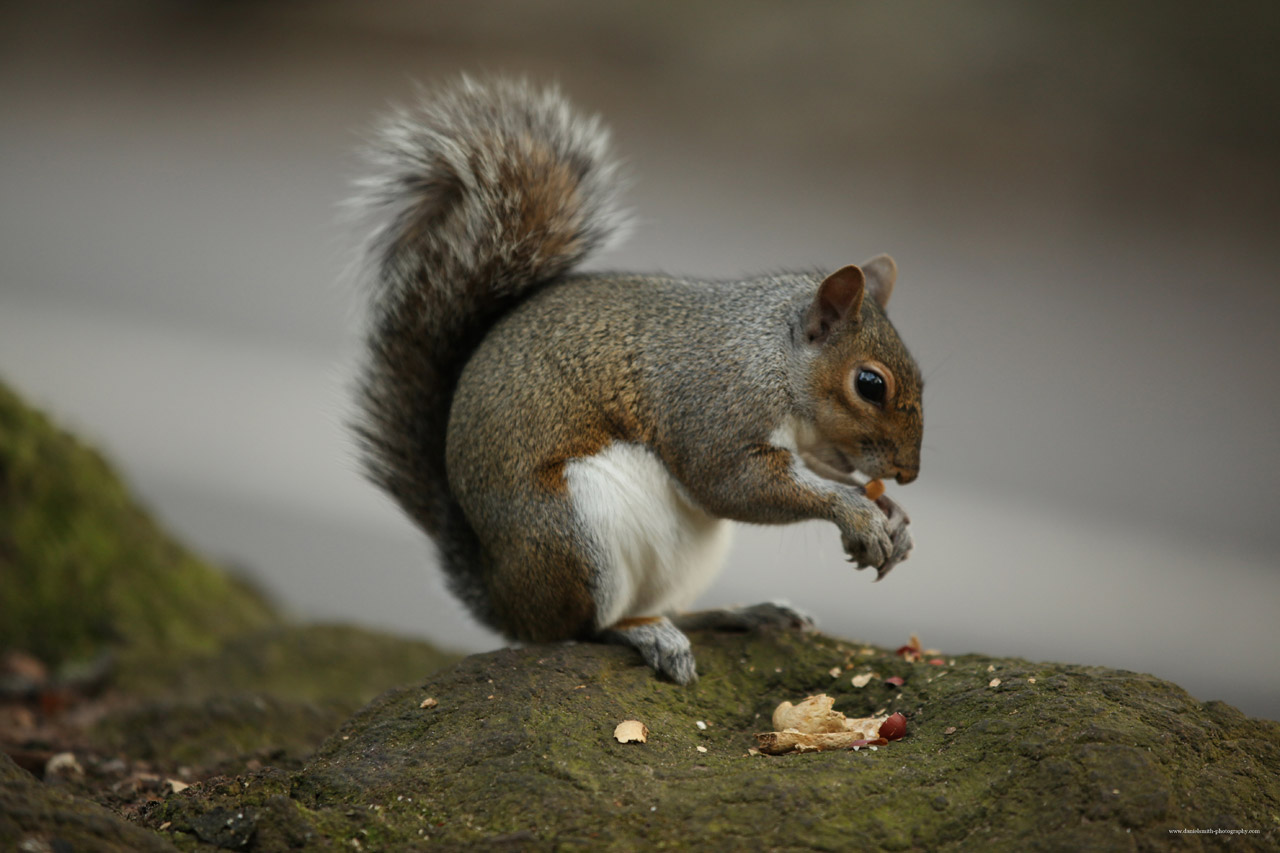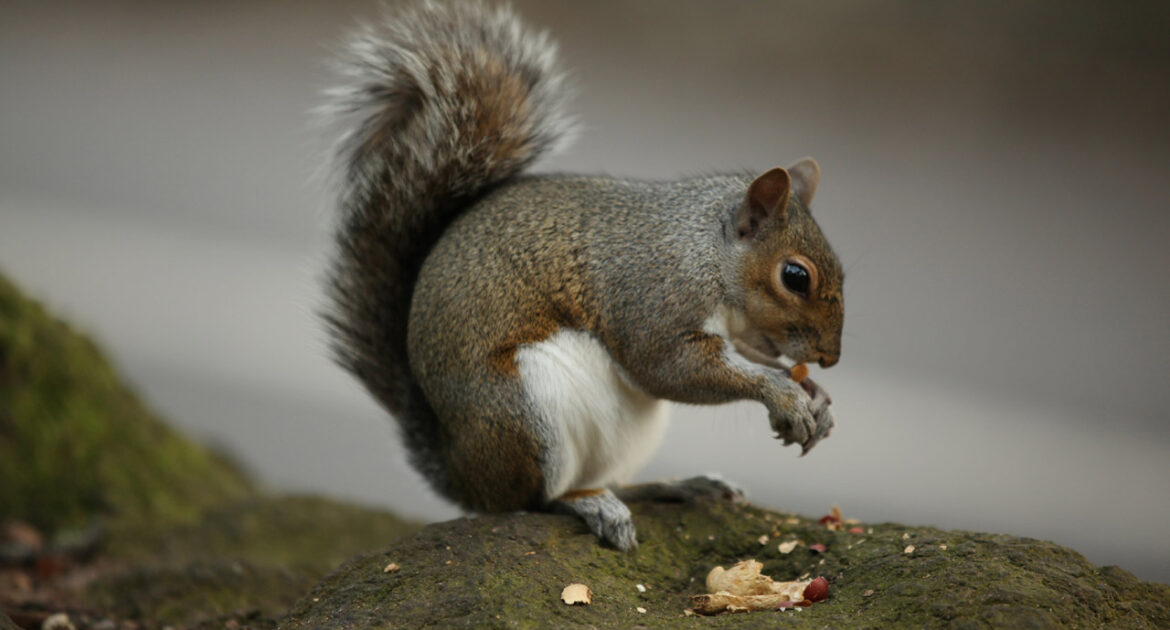Do you often hear rustling noises within your attic and wonder what could be causing it? The culprit could very well be a squirrel. Their curious and busy nature often leads them to our homes, where they find shelter and a constant food supply.
In this blog, we’ll delve into the unique chewing habits of these creatures, uncovering why they chew, what materials they target, and the problems this behavior causes for homeowners.
We’ll also be sure to provide signs that they have taken up residence within your property, the risks associated with an infestation, and effective preventative measures. We will conclude by highlighting the benefits of turning to professional services when handling squirrel removal and why you’d want to choose us as your reliable partner for wildlife control in Oak Grove, Minnesota.
Fascinating creatures as they are, their chewing habits can lead to serious issues for homeowners. Armed with this knowledge, you’ll be better equipped to keep these furry intruders at bay, ensuring your home remains a squirrel-free zone. So, let’s get started on this informative journey on squirrel control and prevention.
What are the Common Chewing Habits of Squirrels?
Squirrels, by nature, are industrious creatures designed for survival in the wild. A key habit that keeps them going is their propensity to chew on things. This instinctual behavior enables them to sharpen their constantly growing teeth. But what are these small creatures likely to munch on most frequently? Well, quite a bit of stuff actually!
- Wood: They love gnawing on wood. This could be anything from tree branches to the wooden structures of your home.
- Power Lines: Surprisingly, they tend to chew on power cables, which poses serious risks such as causing power outages or fire hazards.
- Fruits and Nuts: Nutritious foods like fruits and nuts appeal to these creatures. If you have a fruit tree in your yard, chances are high that there will be frequent visitors.
- Seeds: Birdfeeders are often an attractive source of seeds for squirrels.
- Roof Shingles: They have been known to chew on roof shingles and plastic objects as well, particularly in urban areas where natural food sources are scarce.
What Problems Can Squirrels Cause with Their Chewing Habits?
Squirrels are natural chewers; in fact, their constant gnawing is a biological necessity needed to keep their rapidly growing teeth in check. However, when they take up residence in your home or property, their chewing habits become a significant problem
Infrastructure Damage
Squirrels can cause considerable damage to your home’s infrastructure. Their sharp teeth can gnaw away at wooden beams, causing structural damage that can be expensive to repair. Not only do they chew on wood, but they can also destroy insulation, leading to potential issues with your home’s heating and cooling efficiency.
Electrical Hazards
Perhaps most alarmingly, squirrels have been known to chew on electrical wires, stripping them of their insulation. This can result in a heightened risk of fires, presenting a serious menace to both your property and personal safety. According to the U.S. Fire Administration, rodents, including squirrels, cause approximately 25,000 fires per year.
Landscape Destruction
Outside your home, squirrels can wreak havoc on your landscape. They often chew on tree bark and can ruin plants and other foliage. They may also damage outdoor furniture, garden equipment, and other personal property.
Due to these potential problems, promptly addressing any signs of a squirrel infestation is important. If left unchecked, the damage caused by their chewing habits can snowball into major issues. Remember, the team at our wildlife control is always here to assist you in handling removal effectively and humanely.
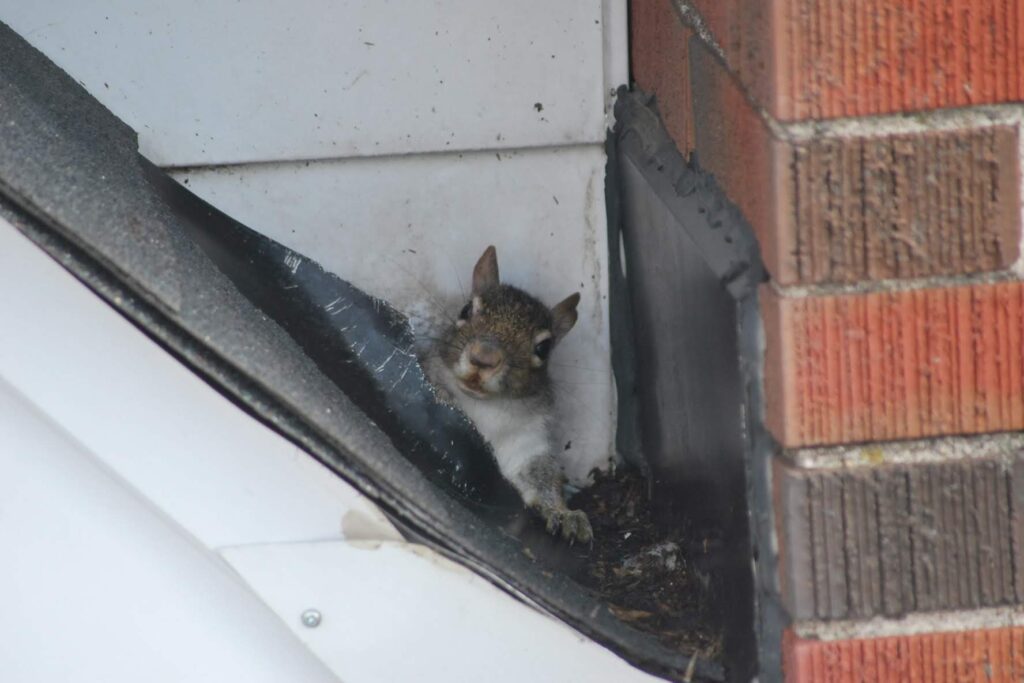
What are the Signs that Squirrels are Living in Your Home?
Squirrels exhibit several signs that can indicate their presence in your home. While these clever rodents may attempt to stay concealed, keen observers can spot the indications of an infestation. Let’s take a closer look.
Noises: They are diurnal, which means they are active during the day. It could be a sign of unwanted guests if you notice unexplained noises, particularly running or scrabbling sounds in your attic or inside your walls during daylight hours. Unlike quieter pests like termites or ants, squirrels make quite a bit of noise as they move around, especially as they often carry nuts or other objects.
Note: These sounds are typically more noticeable early in the morning or in the late afternoon as they head out to forage.
Squirrel Droppings: Any sign of rodent droppings in your home is a clear indication of an infestation. Droppings are very similar to those of bats, so it’s important to have them professionally identified to ensure you’re addressing the correct pest problem.
Damage from Chewing: As we mentioned before, squirrels have a natural habit of chewing. If you notice chewed wires, wood, or structures in or around your house, it may be due to these chew-friendly creatures. They are especially fond of wooden structures, electrical wires, and even some types of plastic pipes due to their teeth that never stop growing.
Nests: Squirrels build nests made of leaves, shredded paper, and other soft materials. If you find such a nest in your attic or inside your walls, you might have a problem.
These are just a few of the signs that these rodents might be living in your home. If you notice any or all of these signs, it’s time to contact professional wildlife control. The team is well-experienced and equipped to handle problems and help you reclaim your home from these furry intruders.
What are the Potential Risks of a Squirrel Infestation?
Squirrels, adorable and seemingly harmless, pose a significantly higher level of risk to your household than you may initially suspect. These bushy-tailed rodents, with their inquisitive nature, can lead to unforeseen problems with serious implications.
They are notorious for their incessant chewing habit, driven by the need to keep their continuously growing teeth in check. Unfortunately, such activity inside your home means they can damage virtually anything, from wooden furniture to insulation and even electrical wires. The risk of electrical shorts or even house fires is a reality when squirrels are present.
Health hazards are another concern. These crafty creatures can carry parasites like fleas and ticks, contributing to their populations in your home and potentially transmitting diseases to humans. They may also leave urine and droppings around your home, which can cause unpleasant odors and contribute to sanitation issues.
- Damage to Home Structure: Constant gnawing can significantly harm your house’s infrastructure, leading to costly repairs.
- Insulation Damage: They often chew insulation for nesting material, reducing energy efficiency in your home.
- Danger of Electrical Short Circuits and Fires: Chewing on electrical wires can cause short circuits or even fire hazards—posing an acute risk to home safety.
- Health Risks: Droppings and urine can potentially cause diseases, allergens, or parasites to breed—which can seriously affect your family’s health.
Nipping the issue in the bud is the key to ensuring an infestation doesn’t lead to significant problems. The expertise of a professional service like ours is invaluable here. We specialize in wildlife control and are proficient in removal. By choosing us, you select a humane and effective solution to your animal problem, ensuring a safe and comfortable environment for your family.
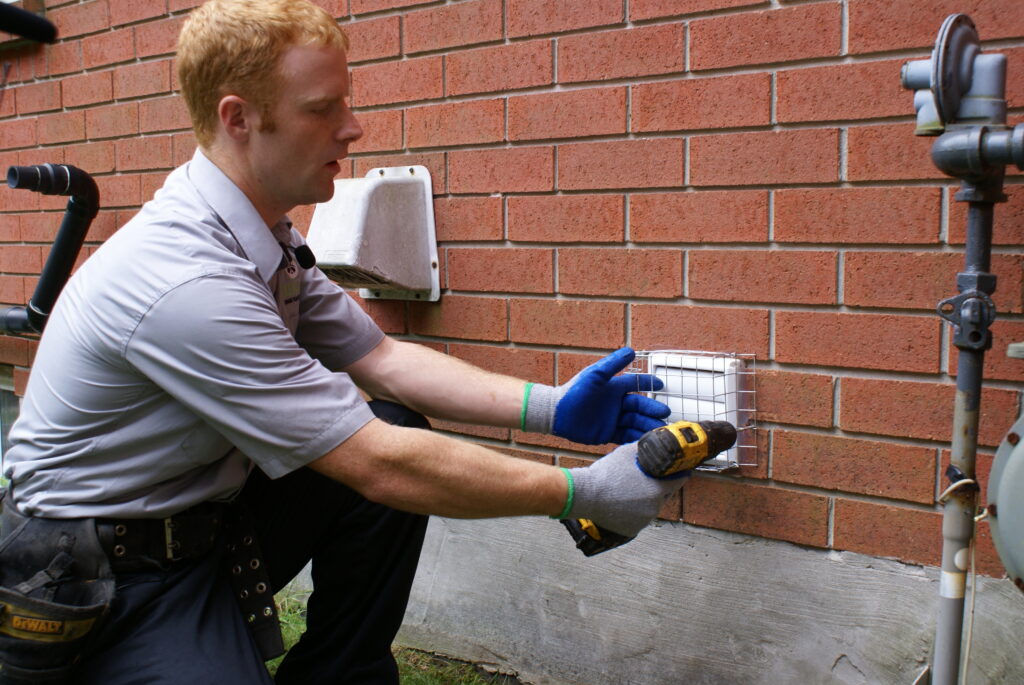
What are Effective Methods to Prevent a Squirrel Problem in Your Home?
Home is where your heart is, and the last thing you want is uninvited rodents disrupting your peaceful haven. Thankfully, you can take several pre-emptive measures to minimize the chances of an infestation. Want to know how to repel squirrels?
Sealing Entry Points
The first and foremost way to deter them from invading your home is by sealing all potential entry points. These nimble creatures are adept at finding weak spots in your home’s exterior, such as loose roof tiles and cracked walls. Invest in high-quality sealants, and consider applying wire mesh over vent openings to prevent these unwelcome guests from setting up their nests.
Trimming Overhanging Tree Branches
As natural climbers, a branch providing a direct route to your roof is more of an invitation rather than an obstacle. Therefore, maintaining a good distance between your house and surrounding trees by regular trimming is an excellent strategy to discourage squirrels from leaping your roof.
Using Repellants
There are numerous repellants on the market, many incorporate predator scents like fox urine to deter squirrels. Before investing in a particular product, make sure it’s safe for both your family and local wildlife. Remember, our goal is to deter, not harm them.
Tidy up Your Yard
Squirrels are opportunistic feeders. An unkempt yard full of fallen fruits, nuts, and a bird feeder within easy reach are prime feeding grounds for these critters. Regular yard cleanup can deprive them of the sustenance they seek, making your home less appealing.
In closing, prevention is always better than cure. However, if you find yourself facing a squirrel problem despite your best efforts, don’t hesitate to consult wildlife control professionals. Their expertise is invaluable in handling the situation effectively and humanely, giving you peace of mind.
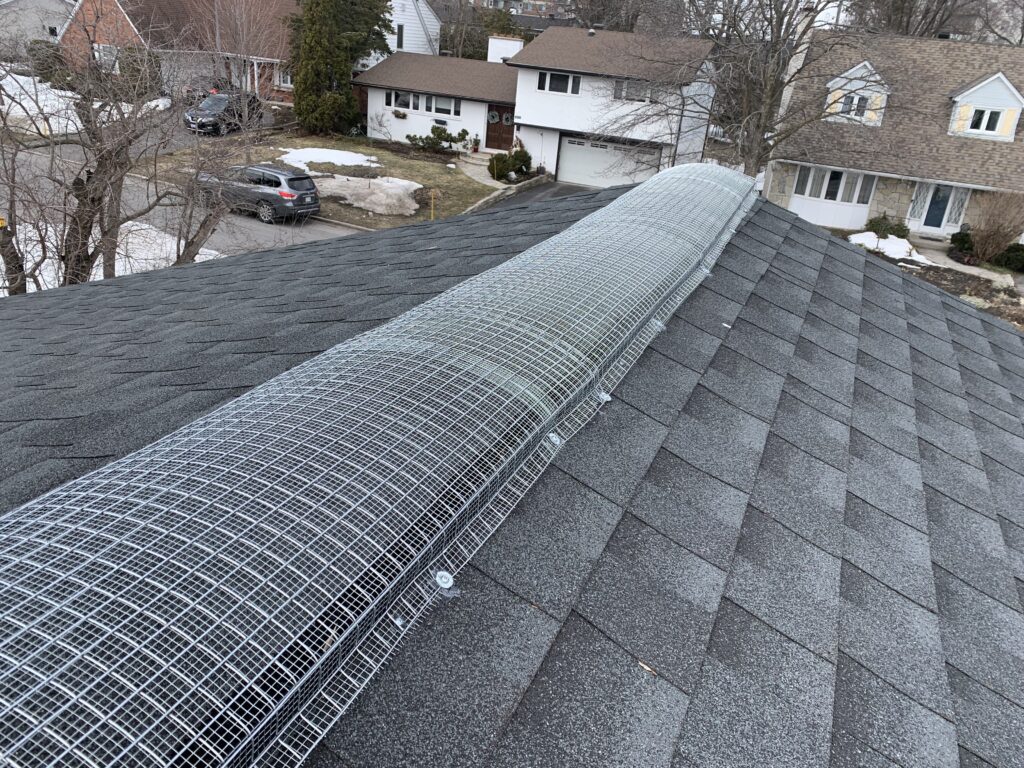
Choose Skedaddle for Reliable Wildlife Removal
When an infestation becomes overwhelming, attempting to resolve it alone might not be the best strategy. Relying on a professional removal service is a safer, more effective route. With our team at Skedaddle Humane Wildlife Control, you’ll benefit from humane and eco-friendly approaches, protecting your home while respecting the wildlife.
From understanding their chewing habits to preventing further infestation, we do it all and more. Our professional team has the skills, knowledge, and experience to ensure they are completely eradicated from your home, and measures are put in place to prevent their return.
Contact us to request a quote and learn more about how we can help you keep your home safe and squirrel-free. Let us be your trusted partner for wildlife control in Oak Grove, Minnesota.
